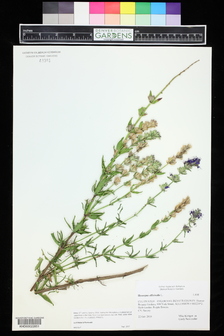Back to Tour: Medicinal Plants Tour
|
Hyssopus officinalis Hyssop |
Denver Botanic Gardens
Gardens Navigator 
|
|
Accession Number: 091111*2 Map | |
| More about Hyssopus officinalis | |
| TOUR DETAILS |
Medicinal uses: Medicinally, hyssop has astringent, emmenagogue (stimulating menstrual flow), relaxant, diuretic, as well as vulnerary ( healing wounds) properties. It stimulates the production of mucus, and is helpful in soothing sore throats, bronchitis and symptoms of cough. It has also been known to help against asthma. Because it also relaxes muscle, it is helpful in aiding digestive problems such as colic. Its antibacterial properties make hyssop a good vermifuge (expels intestinal parasites). Hyssop essential oil has medicinal properties, but has also been linked to inducing epileptic seizures, and should be taken with precaution. Hyssop is medicinally used as tea but can also be placed in bathwater. Mythology/Folklore: History surrounding the uses of hyssop as a medicinal plant, mostly stem from religious sources. According to the bible, hyssop was a cleansing herb, used to purify sin and cleanse the soul. However, there has been controversy over whether the hyssop in the bible is actually H. officinalis due to the fact that the plant isn’t native, nor grows well within the Israeli/Palestine region. The word “hyssop” comes from Greek and Latin hyssopus, meaning cleansing. The Greeks used it to clean sacred places. For Tibetan priests, hyssop is offered to their deities during sacred services. An old saying shows hyssop’s reputation: “Whoever rival’s hyssop’s virtues, knows too much.” Medicinal recipe: Hyssop Oxamel: What you will need: organic apple cider vinegar, raw local honey, organic herbs hyssop leaves, pint jar, pan to decoct, jar for storage Directions: The ratio for this oxymel is 1 part dried herb to 3 parts vinegar and honey. Place desired herbs into pint jar (1/4 - 1/5 of the way full), cover with apple cider vinegar and honey. You can stir before sealing the jar or seal the jar and shake until well mixed. Now let your jar sit somewhere cool and dark and shake a couple of times a week. After two weeks, strain and pour into a glass jar for storage. Culture: (from Loddie Dolinski, staff horticulturalist) This plant is pretty hardy and doesn’t need too much water. Once it’s been established it merely needs normal watering. It should be grown in full sun. Hyssop gets no pests after it’s grown. |
| LOCATION GROUP | Romantic Garden - Fragrance Garden |
| FAMILY NAME | Mint Family |
| FAMILY | Lamiaceae |
| ACCESSION DATE |
July 22, 2009 (When this plant was acquired and registered in the database) |
| FLOWER COLOR | blue;white |
| FLOWER COLOR NOTE | light, varies to light purple ;general appearance |
| USDA HZ | 6 (Coldest Zone Where Hardy) |
| HABIT | Herbaceous (Non-woody) |
| IN MEMORY/HONOR OF | N/A |
Location Map for 091111*2 Hyssopus officinalis
Map Help
Fruiting
When Hyssopus officinalis has been observed fruiting at Denver Botanic Gardens
 | ||||||||||||||||||||||||||||||||||||||||||||||||||||
| 2018 |  |
 |
 |
 |
 |
 |
 |
 |
 |
 |
 |
 |
 |
 |
 |
 |
 |
 |
 |
 |
 |
 |
 |
 |
 |
 |
 |
 |
 |
 |
 |
 |
 |
 |
 |
 |
 |
 |
 |
 |
 |
 |
 |
 |
 |
 |
 |
 |
 |
 |
 |
 |

© Denver Botanic Gardens, 1007 York Street, Denver, CO 80206
Photography © Denver Botanic Gardens

Powered by







 E-mail
E-mail